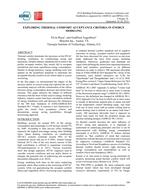
Exploring Thermal Comfort Acceptance Criteria in Energy Modeling
- Comments Off on Exploring Thermal Comfort Acceptance Criteria in Energy Modeling
- ASHRAE
Click here to purchase
Thermal comfort dominates the decisions on the HVAC (heating, ventilation, air conditioning) sizing and operations. Despite industry standards aim to achieve the perfect occupant comfort, they mostly fail in occupant satisfaction and cause superfluous energy consumption. Similar to design practices, energy modeling tools also depend on the predefined standards to determine the acceptable thermal comfort levels which leads to system oversizing. In the first paper, we demonstrated the impact of the autosize option in system sizing and explored the use of uncertainty analysis with the consideration of the offsets between energy consumption decrease and unmet hours increase. This paper analyzes the impact of different tolerances that has been widely used in energy modeling industry, inspects unmet load hour calculation methods of energy simulation tools and discusses the robustness of the 300 hour limitation of ANSI/ASHRAE/IES Standard 90.1. Finally, it explores a new framework to guide the unmet hour acceptance criteria and demonstrate energy saving possibilities through downsizing approach.
Citation: ASHRAE/IBPSA-USA Bldg Simulation Conf, Sept 2018
Product Details
- Published:
- 2018
- Number of Pages:
- 8
- Units of Measure:
- Dual
- File Size:
- 1 file , 4.4 MB
- Product Code(s):
- D-BSC18-C036

